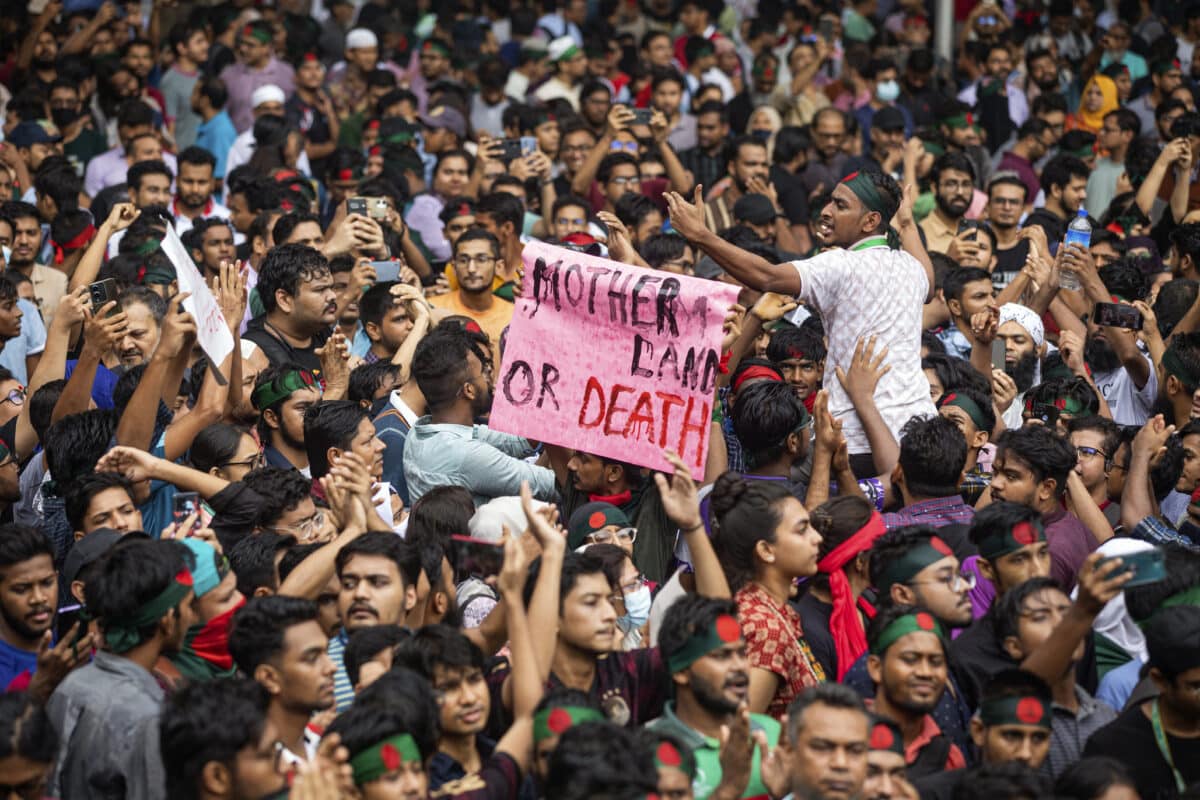
Individuals take part in a protest march towards Prime Minister Sheikh Hasina and her authorities to demand justice for the victims killed within the current countrywide lethal clashes, in Dhaka, Bangladesh, Saturday, Aug. 3, 2024. (AP Picture/Rajib Dhar)
DHAKA, Bangladesh — A brand new spherical of violence in Bangladesh left not less than eight individuals useless and tons of of others injured as pupil protesters clashed with police and ruling social gathering activists on Sunday, officers and media reviews stated, as protests that started over a authorities jobs quota continued with calls for for the resignation of Prime Minister Sheikh Hasina.
The protests started as college students referred to as for an finish to a quota system that awarded 30% of presidency jobs to family members of veterans, however escalated into violence that left greater than 200 useless in July.
Authorities closed faculties and universities throughout the nation, blocked web entry and imposed a shoot-on-sight curfew. Not less than 11,000 individuals have been arrested in current weeks.
Protesters referred to as for “non-cooperation,” urging individuals to not pay taxes and utility payments and never present up for work on Sunday, a working day in Bangladesh. Places of work, banks and factories opened, whereas commuters in Dhaka and different cities confronted challenges attending to work.
In the meantime, 1000’s of members of the ruling Awami League social gathering and its affiliate our bodies took to the streets for counterprotests, elevating the danger of violent confrontations.
Protesters attacked Bangabandhu Sheikh Mujib Medical College, a significant public hospital in Dhaka’s Shahbagh space, torching a number of autos.
In Dhaka’s Uttara neighborhood, police fired teargas to disperse tons of of protesters who blocked a significant freeway. Protesters attacked properties and vandalized a neighborhood welfare workplace within the space, the place tons of of ruling social gathering activists took positions. Some crude bombs have been detonated and gunshots have been heard, witnesses stated.
Abu Hena, a hospital official in Munshiganj district close to Dhaka, stated two individuals have been declared useless after being rushed to a hospital with accidents.
Jamuna TV station reported one other six deaths in Bogura, Magura, Rangpur and Sirajganj districts, the place the protesters backed by the nation’s foremost opposition Bangladesh Nationalist Get together clashed with police and the activists of the ruling Awami League social gathering and its related our bodies.
Customers complained of disruptions in cell web service on Sunday afternoon and plenty of others confronted issues accessing Fb.
The protests started final month as college students demanded an finish to a quota system that reserved 30% of presidency jobs for the households of veterans who fought in Bangladesh’s struggle of independence towards Pakistan in 1971. As violence crested, the nation’s Supreme Court docket scaled again the quota system to five% of jobs, with 3% for family members of veterans, however protests have continued demanding accountability for violence the demonstrators blame on the federal government’s use of extreme power.
The quota system additionally consists of quotas members of ethnic minorities, and disabled and transgender individuals, which have been minimize from 26% to 2% within the ruling.
Hasina’s administration has blamed the principle opposition Bangladesh Nationalist Get together and now-banned right-wing Jamaat-e-Islami social gathering and their pupil wings for instigating violence, wherein a number of state-owned institutions have been additionally torched or vandalized.
Mirza Fakhrul Islam Alamgir, secretary-general of the principle opposition social gathering, repeated a name for the federal government to step right down to cease the chaos.
Hasina provided to speak with pupil leaders on Saturday, however a coordinator refused and introduced a one-point demand for her resignation.
Hasina repeated her pledges to totally examine the deaths and punish these liable for the violence. She stated that her doorways have been open for talks and he or she was prepared to take a seat down at any time when the protesters need.
The protests have grow to be a significant problem for Hasina, who has dominated the nation for over 15 years, returning to energy for a fourth consecutive time period in January in an election that was boycotted by her foremost opponents.

